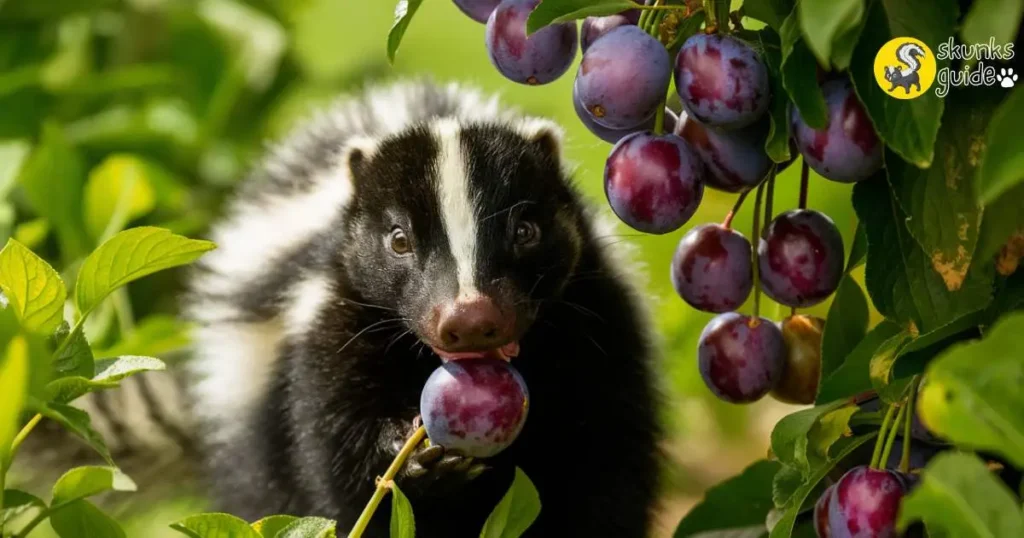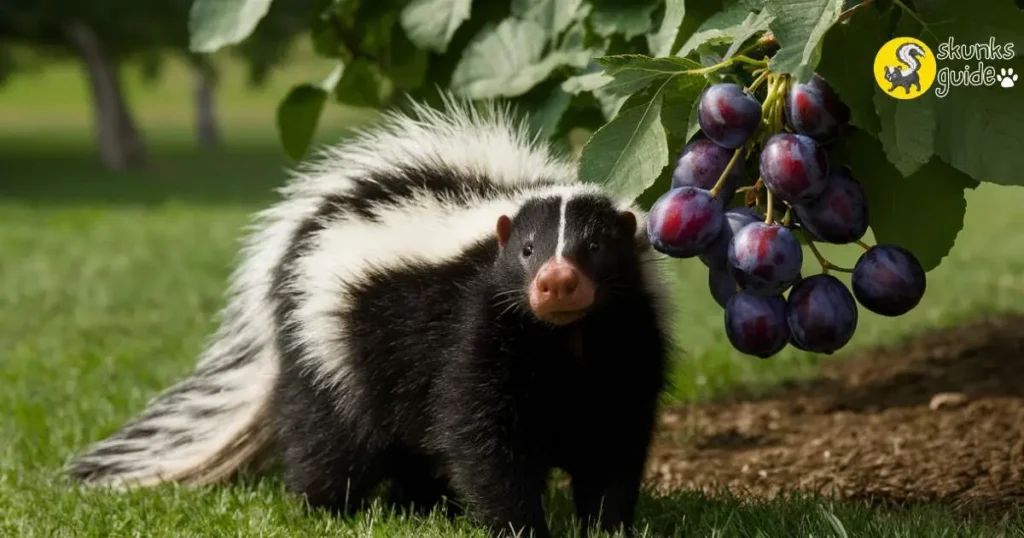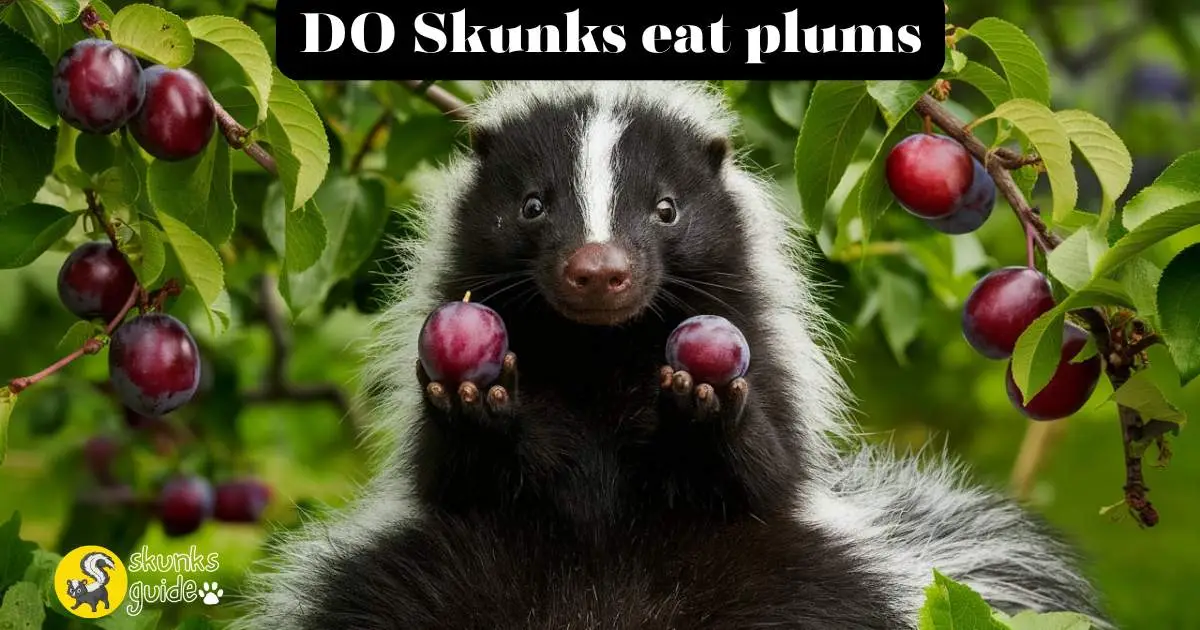Are Plums Safe for Skunks? Here’s What to Consider
Yes, skunks do eat plums! As someone who has researched both wild skunks and kept them as pets, I’ve learned that these furry creatures have a real taste for sweet fruits like plums. When these juicy treats drop from trees or are left out in the garden, skunks can’t resist. If you’re curious about how skunks fit into your backyard or just want to know more about their eating habits, keep reading to find out how they balance their diet with plums and other tasty treats.
Plums On The Menu?
Are plums a tasty treat for skunks? Many wonder if these small mammals enjoy fruits. Let’s explore the relationship between skunks and plums.
Skunks And Fruit Consumption
Skunks are omnivores. They eat both plants and animals. Their diet includes:
- Insects
- Small mammals
- Fruits
- Vegetables
Fruits are a significant part of their diet. Skunks find fruits appealing, especially when they are ripe. Skunks often seek out fruit trees. They love to munch on whatever is available.
The Attraction Of Plums To Skunks
Plums are sweet and juicy. Their flavor attracts skunks. Here are some reasons why skunks enjoy plums:
| Reason | Description |
|---|---|
| Sweetness | Ripe plums have a delightful taste. |
| Soft Texture | Plums are easy to chew. |
| Nutritional Value | They provide vitamins and hydration. |
Skunks often raid gardens for ripe plums. They can easily climb low branches or knock down fruit. This makes plums a perfect snack for them.
In summary, skunks include plums in their diet. Their attraction to sweet, juicy fruits is clear. Plums are definitely on the menu for these curious creatures!
Nutritional Value Of Plums For Skunks
Plums are juicy fruits rich in vitamins and minerals. They can be a tasty treat for skunks. Understanding the nutritional value helps in providing a balanced diet. Let’s explore the benefits and risks of plums for skunks.

Benefits Of Plums In A Skunk’s Diet
Plums offer several health benefits for skunks:
- Rich in Vitamins: Plums contain vitamins A, C, and K.
- High in Fiber: Fiber aids in digestion.
- Low in Calories: Plums are a low-calorie snack.
- Hydration: Plums have a high water content.
These benefits support overall health and well-being. Here’s a breakdown of nutrients found in plums:
| Nutrient | Amount per 100g |
|---|---|
| Calories | 46 |
| Vitamin C | 9.5 mg |
| Fiber | 1.4 g |
| Water | 86% |
Potential Risks And Considerations
While plums are healthy, there are some risks:
- Seeds: Plum seeds are toxic to skunks.
- Overfeeding: Too many plums can cause diarrhea.
- Allergies: Some skunks may be allergic.
Always wash plums before serving. Cut them into small pieces. Monitor skunks for any adverse reactions. Consult a vet for personalized advice.
Wild Skunks Vs. Domestic Skunks
Understanding the differences between wild and domestic skunks helps us know their eating habits. Both types enjoy various foods, but their diets can vary greatly. This section explores the dietary needs and plum availability for each type.
Dietary Differences
Wild skunks and domestic skunks have different diets. Here’s a quick comparison:
| Feature | Wild Skunks | Domestic Skunks |
|---|---|---|
| Diet Type | Omnivorous | Omnivorous |
| Food Sources | Insects, fruits, small animals | Specialized pet food, fruits, vegetables |
| Natural Foraging | Forages in the wild | Depends on owners for food |
Both types enjoy plums, but how they get them varies. Wild skunks find plums in nature. Domestic skunks rely on their owners for treats.
Plum Availability In Natural Habitats
Plums grow in many areas where wild skunks live. They often find ripe plums in orchards and gardens. Here are some key points:
- Wild skunks forage during summer.
- Plums are a seasonal treat for them.
- They eat ripe and fallen plums.
Domestic skunks may not have direct access to plums. Owners can offer plums as a special treat. Remember these tips when feeding plums:
- Wash plums thoroughly.
- Remove pits to avoid choking.
- Serve in small pieces.
Understanding these differences helps ensure the well-being of both wild and domestic skunks. Wild skunks naturally find plums, while domestic skunks rely on their human companions.
Protecting Plum Orchards
Plum orchards face various threats, including skunks. These animals enjoy ripe plums. Protecting orchards is crucial for farmers. Effective strategies can minimize damage and ensure a fruitful harvest.

Preventive Measures For Farmers
Farmers can use several preventive measures to protect their plum orchards. Here are some effective strategies:
- Fencing: Install tall fences around orchards.
- Trap Placement: Set traps near plum trees.
- Regular Inspections: Check for signs of skunks weekly.
- Timing: Harvest fruits early to avoid skunks.
Safe Deterrents For Skunks
Using safe deterrents helps keep skunks away from plum trees. Here are some effective options:
| Deterrent Method | Description |
|---|---|
| Motion-Activated Sprinklers | Water sprays when skunks approach. |
| Natural Repellents | Cayenne pepper or vinegar can deter skunks. |
| Ultrasonic Devices | Emit sounds that irritate skunks. |
| Noise Makers | Banging pots or loud noises scare skunks away. |
Implementing these methods can protect plum orchards effectively.
Responsible Feeding Practices
Feeding pet skunks requires careful planning. A balanced diet is essential for their health. Skunks can eat fruits, but moderation is key. Understanding their nutritional needs helps in providing the right food.
Providing Balanced Diets For Pet Skunks
Skunks are omnivores. They need a mix of proteins, fats, and carbohydrates. Here’s a simple breakdown:
| Nutrient | Sources |
|---|---|
| Proteins | Insects, cooked eggs, and lean meats |
| Fats | Nuts, seeds, and fish oils |
| Carbohydrates | Fruits, vegetables, and grains |
Focus on these key points:
- Variety is crucial for a balanced diet.
- Avoid processed foods and sugary snacks.
- Always provide fresh water.
The Role Of Fruits In Captive Skunk Care
Fruits can be a tasty treat for skunks. They offer vitamins and hydration. Choose fruits that are safe and healthy:
- Apples (without seeds)
- Bananas
- Blueberries
- Peaches (without pits)
- Plums (in moderation)
Limit fruit servings to avoid sugar overload. Too much fruit can lead to digestive issues. Always wash fruits before serving them to your skunk.
Frequently Asked Questions
What Fruits Do Skunks Eat?
Skunks enjoy a variety of fruits. Common favorites include berries, apples, grapes, and peaches. They may also eat melons and cherries. Skunks are opportunistic feeders and will consume fruit when available, especially in gardens or orchards.
Are Skunks Attracted To Fruit?
Yes, skunks are attracted to fruit. They enjoy a variety of fruits, including berries, apples, and peaches. Leaving fruit out can draw them to your yard. To prevent attracting skunks, secure trash and clean up fallen fruit regularly.
What Foods Are Poisonous To Skunks?
Foods poisonous to skunks include chocolate, grapes, raisins, onions, garlic, and avocados. These items can cause severe health issues. Always provide skunks with safe, appropriate foods to ensure their well-being. Avoid human food that may harm them. Prioritize their dietary needs for a healthy life.
Conclusion
Skunks are known to enjoy various fruits, including plums. Their diet can vary based on availability. While they may snack on your plums, they also help control pests in your garden. Understanding their feeding habits can help you coexist peacefully with these creatures.

